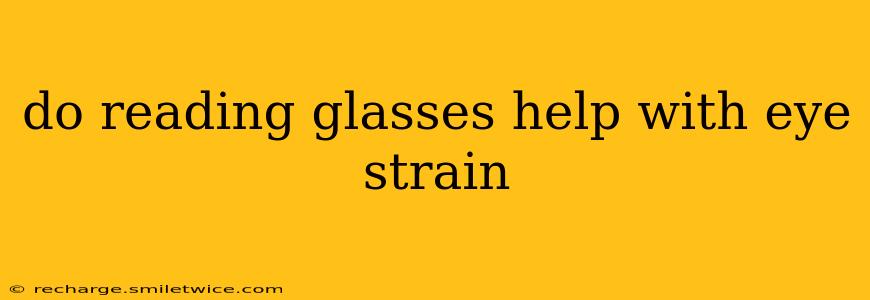Eye strain is a common complaint, often exacerbated by prolonged near-work activities like reading, working on computers, or using smartphones. Many people wonder if reading glasses can alleviate this discomfort. The answer is nuanced and depends on the cause of your eye strain.
What Causes Eye Strain?
Before diving into the role of reading glasses, let's understand the root causes of eye strain. Several factors can contribute:
- Focusing Problems: Your eyes constantly adjust focus to view objects at different distances. Difficulty focusing, especially for near work, can lead to significant strain. This is often linked to presbyopia (age-related loss of near vision) or uncorrected refractive errors (nearsightedness, farsightedness, astigmatism).
- Dry Eyes: Insufficient tear production or poor tear quality can irritate the eyes, causing dryness, burning, and strain. Prolonged screen time is a major culprit.
- Poor Lighting: Inadequate or harsh lighting makes it harder for your eyes to focus comfortably, leading to fatigue and strain.
- Incorrect Posture: Hunching over while reading or working on a computer strains neck and shoulder muscles, indirectly affecting eye comfort.
- Eye Diseases: In some cases, underlying eye conditions like glaucoma or cataracts contribute to eye strain.
How Reading Glasses Can Help with Eye Strain
Reading glasses primarily address focusing problems related to presbyopia. Presbyopia causes the eye's lens to lose its flexibility, making it difficult to focus on near objects. Reading glasses provide the extra focusing power needed to see clearly up close, reducing the effort your eyes need to exert. This, in turn, can significantly lessen eye strain associated with near-work activities.
However, reading glasses may not help if your eye strain stems from other causes like dry eyes, poor lighting, or uncorrected refractive errors.
Do Reading Glasses Help with Eye Strain if I Don't Have Presbyopia?
If you're experiencing eye strain but don't have presbyopia, reading glasses might not be the solution, and could even worsen your symptoms. If you have uncorrected nearsightedness or farsightedness, using reading glasses without a proper eye exam can actually increase eye strain. You'll need a comprehensive eye examination to determine the correct prescription for your specific refractive error.
Can Reading Glasses Worsen Eye Strain?
While reading glasses can be beneficial for presbyopia, using the wrong prescription or using them when not necessary can lead to increased eye strain. For example, if you have farsightedness and use reading glasses designed for someone with nearsightedness, your eyes will have to work harder to compensate, leading to increased fatigue and eye strain.
What if Reading Glasses Don't Solve My Eye Strain?
If your eye strain persists despite using reading glasses, it’s crucial to consult an ophthalmologist or optometrist. They can perform a comprehensive eye exam to identify the underlying cause of your discomfort. They may recommend various treatments, including:
- Corrective Lenses: For uncorrected refractive errors.
- Artificial Tears: To alleviate dry eye symptoms.
- Lifestyle Changes: Such as taking breaks from near work, improving lighting conditions, and maintaining proper posture.
What are the Alternatives to Reading Glasses for Eye Strain?
Several strategies can help reduce eye strain, independent of reading glasses:
- The 20-20-20 Rule: Every 20 minutes, look at an object 20 feet away for 20 seconds.
- Regular Breaks: Take frequent breaks from near-work activities.
- Proper Lighting: Ensure adequate, glare-free lighting.
- Ergonomics: Maintain good posture and position your screen at the correct distance and height.
- Artificial Tears: Use lubricating eye drops to relieve dryness.
In conclusion, reading glasses can be a helpful solution for eye strain caused by presbyopia. However, they're not a one-size-fits-all answer. A comprehensive eye examination is crucial to determine the underlying cause of your eye strain and find the most appropriate solution. Ignoring eye strain can lead to further complications, so seeking professional advice is always recommended.
